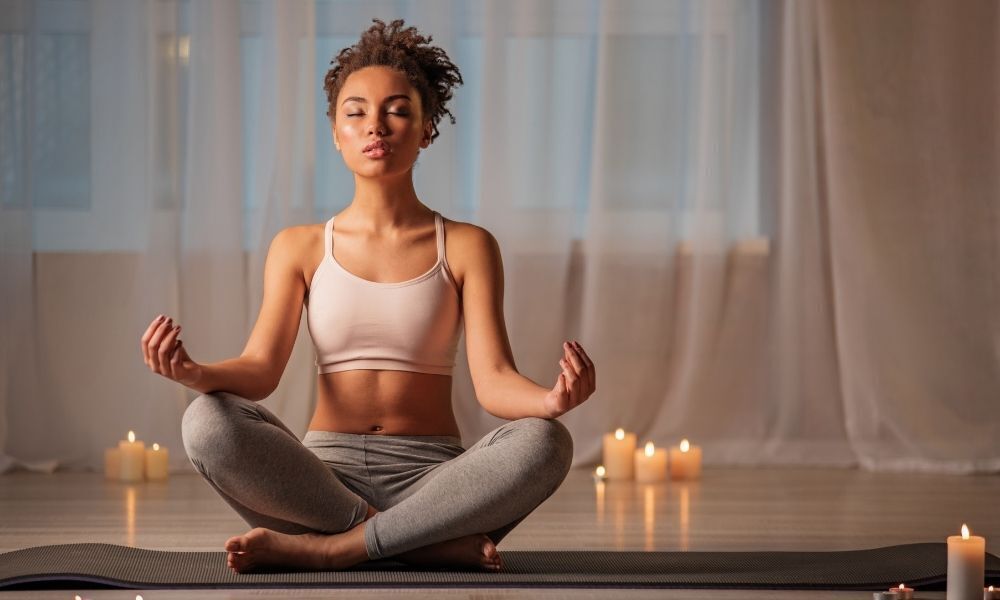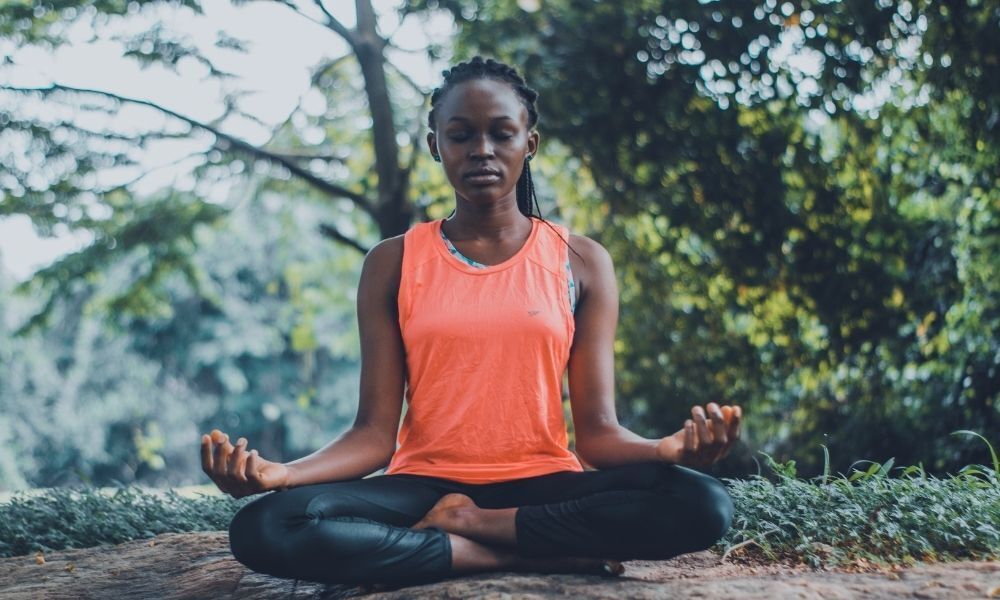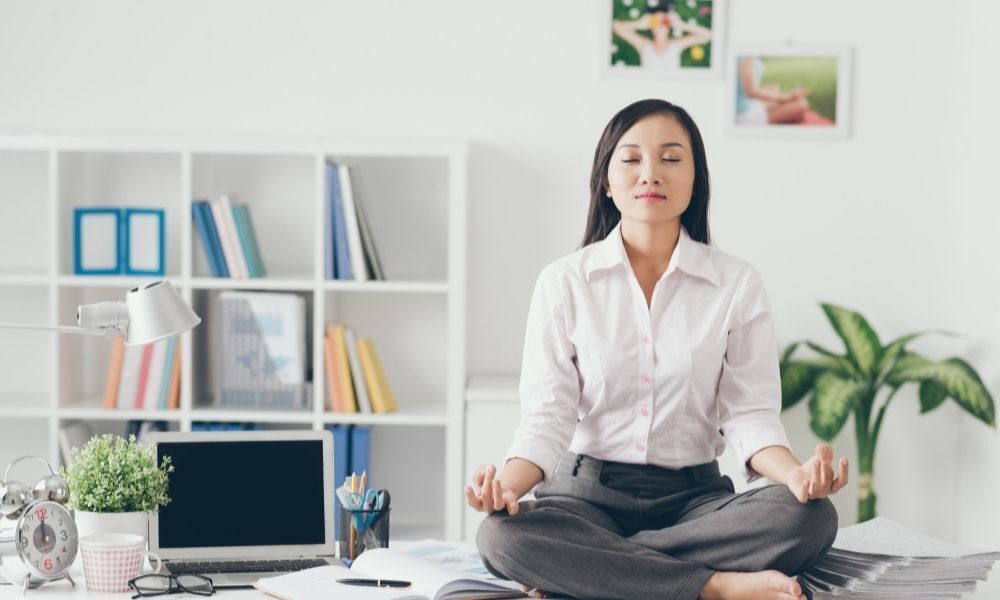Table of contents
Learn all about how to get started in meditation!

Many people find it difficult to start doing meditation. An important point for this beginning is to understand that it is not necessary to have experience or great knowledge to start. Meditation for beginners can be simple, without many charges and will be of great help to improve stress, nervousness and increase the focus and energy of practitioners.
To start the practice of meditation people can use some existing methods on the internet, because today there are several videos that help in this journey. In addition, there are several modalities of meditation even for beginners, so people can choose the one with which they identify more.
In this article we will talk about various issues related to meditation for those who are starting out, in addition to information such as: what is it, what are the benefits of meditation and some tips on how to practice meditation.
Understanding meditation

Meditation is a way for people to control their mind, relax and increase their cognitive capacity. The practice is not directly linked to a religion, so it is independent of beliefs and brings many benefits to everyone.
Below we will talk about what is meditation, what is its history and origin, how to practice meditation for beginners and what are the types of meditation. Read on to better understand this ancient practice.
What is it?
The practice of meditation for beginners or more experienced people, is a technique that aims to bring the mind into a state of calm and relaxation. This activity involves postures and focus on full presence to achieve serenity and inner peace.
Thus, doing meditation helps reduce stress, anxiety and insomnia. In addition, it also increases the ability to focus and productivity at work and studies. Meditation, even for beginners, can be practiced either with the assistance of an instructor or alone. It can even be done at work, or even on the transport, on the way to work.
How to do it?
There is no complexity to start the practice of meditation. Just find a quiet place, close your eyes and try to push thoughts away. There is no need to avoid thoughts, just let them come and go, don't keep them.
Silence is not essential during meditation, it is even possible to pay attention to the sounds around you, this is a way to stay present. Pay attention to your breathing, take deep breaths slowly, moving your belly, then release the air slowly until it empties completely. Attention to the movement of the breath brings relaxation.
Which type of meditation to choose?
There are many ways to practice meditation, but there are common points among them, such as a comfortable posture, having a focus of attention, a space as quiet as possible and a non-judgmental attitude. For beginners, it is possible to meditate from 1 to 5 times a day, for 5 minutes, and gradually increase the duration.
Below we will leave the variations in the types of meditation:
Benefits of meditation

The benefits brought by meditation for beginners or more experienced people are enormous and have an effect on several areas of life. Studies have shown that this practice causes wonderful effects on both the body and mind of practitioners.
Below we will show you what these benefits are, such as reduced stress, increased focus, a sense of lightness, improved sleep quality, re-evaluation of priorities, increased quality of breathing, and improved overall health.
Stress reduction
The practice of meditation allows people to reduce stress and diseases brought by this disease that affects so many people. This benefit is directly linked to the state of relaxation brought by meditation.
By making people focus only on the present moment, without worrying about the past or the future, a state of full relaxation occurs. Studies have even shown that meditation also helps reduce anxiety and control phobias.
Increased focus
Another point that is benefited by the practice of meditation for beginners is that of the focus that increases, which consequently improves concentration. It also helps to increase the degree of self-knowledge of people, leading to the elimination of limitations.
Moreover, this practice collaborates to increase the well-being and quality of life of people, both personally and professionally, bringing greater productivity. In addition, people become calmer, which reduces the likelihood of conflicts at work, which makes them have a better relationship with colleagues.
Sense of lightness
The feeling of lightness is another benefit brought by meditation, with this people become calmer, less stressed and more attentive. Thus, the day to day activities are performed much more efficiently.
This occurs because people find themselves in a state of plenitude, with conditions to better enjoy the present moment. In addition, meditation is also a great option to support treatments for depression, because it brings to practitioners a more optimistic view of life.
Reassessment of priorities
With the daily practice of meditation for beginners or not, people acquire more self-knowledge every day. Thus, they can look at their activities and re-evaluate more clearly what their real priorities are.
This is because people dedicate more time to their needs and thus are able to pay more attention to their thoughts and attitudes. They are able to question whether they have acted in a manner consistent with what they believe and what is important to them.
Improved quality of sleep
By getting people to calm their thoughts and focus on their breathing, meditation leads to a state of relaxation. As a result, stress and anxiety levels decrease, causing sleep quality to improve as well.
In this way, people are able to go to bed without negative thoughts, and they are also able to get rid of worries more easily. Thus, they are able to fall asleep more easily and have a peaceful night with full rest.
Benefits for breathing
During the practice of meditation, one of the activities is full attention, that is, the observation of the breath, in this way your way of breathing is changed. This activity makes the practitioner learn to breathe through the diaphragm, no longer moving the chest to fill the lungs with air.
As a result, the rhythm of breathing at rest consciously decreases. Even practitioners of this technique report, that slower and deeper breathing releases physiological responses in sequence. This causes a more complete level of relaxation to be achieved.
Improvement in general health
People who practice meditation daily, over time achieve a normalization of blood pressure. What occurs not only during the practice, but extends during the day, being something quite positive.
Since mindfulness involves passive observation, that is, observing the breath, people are able to change the way they breathe. Thus, they are able to have a more efficient flow of oxygen in the body, bringing the benefit of relaxation.
With a more effective breathing comes a greater relaxation to the practitioner, which improves the levels of stress and anxiety. With this, he has better sleep quality and, consequently, quality of life. This means that meditation causes a general improvement in the health of practitioners.
Tips for getting started in meditation

It is recommended that meditation for beginners be done by doing small periods of time, with a practice of 5 a day. After this introduction of a few days, the time is gradually increased.
See in this section of the article some tips for those who want to start the practice of meditation. Read information such as: the best time, the choice of place, the correct position, the clothes for the practice, and more.
Set a good schedule
The best time to practice meditation for beginners is when it is possible not to have any interruptions. The ideal is to reserve 1 or 2 moments of the day to practice in a quiet way. Starting the day with a moment of full attention is a great help to have a calmer day.
Another very favorable time for meditation, is the moment before bedtime, making the mind to calm down a little for a peaceful sleep. The ideal is to do meditation during the time of 15 to 20 minutes, but for those who are beginning the practice, it is more advisable to do 5 and gradually increase the time.
Choose a quiet place
A quiet place is ideal to practice meditation, the bedroom, a garden or a room, where there are no interruptions. However, in moments of tension in everyday life, it is also possible to do it sitting in the office chair. Five minutes will be enough to lower the adrenaline. It is recommended to be in a quiet place, where there are as few distractions as possible, which facilitates theconcentration.
Find a comfortable position
The most traditional position, brought from Eastern practices, is the lotus posture, which consists of sitting cross-legged, with the feet on the thighs, just above the knees and with the spine erect. However, this posture is not easy to perform, especially for meditation practice for beginners, and it is also not mandatory.
It is also possible to perform the meditation sitting on a chair or bench, as the important thing is to be comfortable, with a straight spine, and with neck and shoulders relaxed and aligned. Normally the hands are rested on the knees or on the lap, one on the palm of the other. The legs should be kept closed, but keeping your muscles relaxed.
Wear comfortable clothing
It is not necessary to have special clothes for meditation practice, but it is important to wear comfortable clothes, so that they do not take your attention away from your breathing. For example, a tight part of your clothes will automatically divide your attention.
Therefore, prefer to wear lighter clothes, loose and flexible fabrics, cotton or mesh are good options. A suggestion is to wear shorts or loose pants, loose blouses, made of soft fabrics and that do not get hot and let the skin breathe.
Concentrate on your breathing
Meditation is a time to pay more attention to your breathing, and thus learn to make full use of your lungs. Calmly and attentively inhale deeply, drawing in air through your belly, and then exhale slowly and pleasantly.
Controlling your breathing may seem difficult for those just beginning the practice of meditation, but it needs to be comfortable and effortless. One technique that helps with breathing is to count to 4 on the inhale and then again on the exhale.
Listen to some relaxing music
Listening to soft and relaxing music can help at the moment of meditation, especially for those who are beginning this process of self-knowledge. Music is an instrument that helps reduce stress and helps prepare the mind for the moment of concentration.
Music, since ancient times, has been used to control emotions, alter states of consciousness and promote healing through its rhythm. Studies have revealed that music can alter the rhythm of brain waves, heart rate, blood pressure and breathing.
Make meditation a habit
Making meditation a habit will bring numerous benefits to people's mental and physical health. Turning (positive) activities into habit is a very powerful action, when meditation becomes a daily routine, it increases the practitioner's quality of life.
Don't cover yourself so much
Starting the practice of meditation should be a pleasurable process, don't beat yourself up if the first few times you don't seem to be able to concentrate. This is normal, it is a new activity and like anything new, it needs practice to improve.
Don't beat yourself up for not being able to eliminate thoughts, that's not the point of meditation, let the thoughts come and go, just don't get attached to them. Gradually focusing on the breath and the present moment will become easier.
Practice mindfulness
The practice of mindfulness during meditation is linked to focusing attention on the breath. In traditional meditation, practitioners use mantras, which are the repetition of specific sounds that exert a certain power over the mind, aiding concentration.
Mantras can be repeated out loud or just mentally during meditation. "OM" is the best known mantra and has the power to bring inner peace. There are also other ways to maintain concentration like soft music, images, the breath itself and even positive thoughts and visualization of goals. The important thing is to keep the mind quiet.
Try guided meditation
Guided meditation is done in a group or alone, but with the help of someone who is guiding the practice. A trained teacher, for example. It is possible to do guided meditation in a personal way, with someone next to the practitioner, or even with video, audio or even in writing.
It is also possible to do a combination of several of these options, the important thing is to receive assistance to get into concentration.
Meditation can change lives!

Meditation for beginners or even the most experienced people, can certainly change people's lives. This practice brings numerous benefits for practitioners, ranging from reducing stress and anxiety to improving sleep quality.
With this, health in general is benefited, since meditation can even improve physical immunity. The body becomes more resistant to pain reducing suffering, not to mention that it is a great ally in the treatment of depression and other psychological syndromes.
Other points that are improved are learning ability, concentration, improved feelings of compassion, kindness and empathy. In addition to all this, it strengthens the inner consciousness, improving unwanted behavior patterns.
In this text the intention was to clarify the benefits brought by meditation for beginners. This is a practice that can bring much peace and happiness to people. Therefore, with this information in hand, it's time to meditate!

